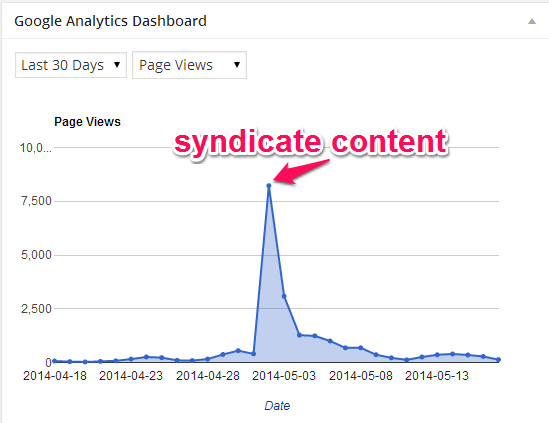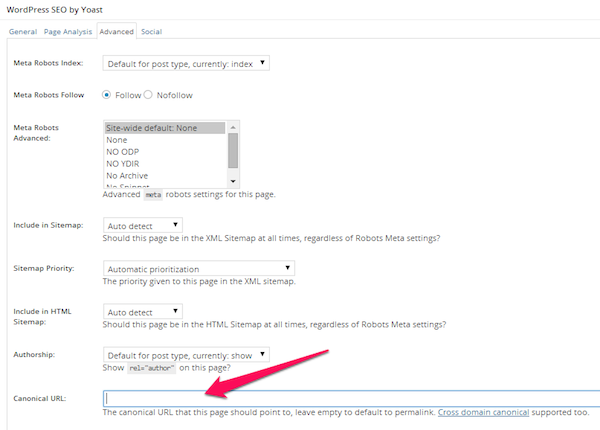Organic blog promotion is a tactic that trips up many content creators since there is rarely one sure-fire to get increased traffic. Some of the strategies marketers use to build traffic include guest blogging. But I’d like to propose another variant which seems to have gotten a bad rap over the years: syndication.
This post won’t touch upon paid syndication networks; you can read about them here. We’ll focus only on organic channels that syndicate your blog’s RSS feed.
Simply stated, syndication is the republishing of your content as-is on another website with proper attribution to the original author.
You may already know that I’m in the “Create Less, Promote More” camp of content creation. So when it comes to promoting a blog post, I’m usually looking for ways to get each painstakingly written blog post reach as many people as possible. The reason this makes sense is because you can put in the effort once to create something helpful and reap the rewards many times over. However syndication is not a panacea and must be treated with caution.
Consider a client’s blog that I’ve been working on for just 5 months. We got our first post syndicated after adhering to a strict publishing schedule and you can see the immediate spike in traffic.

However once the initial publishing euphoria was over, the traffic stats returned to near normal, as is apt to happen in the early stages of content marketing. What’s crucial to note, however, is did we capitalize on conversions during this traffic spike?
Here are the results for email subscribers during this five-month period:

As you can see, there was a 180 percent increase in subscribers corresponding to the traffic spike.
You too can achieve similar or better results by following a few basic content syndication best practices. We’ll discuss them below but first let’s tackle some negative associations with syndicating content.
Why Has Syndication Traditionally Been Frowned Upon?
The most recurrent arguments that come up against syndicating blog content are:
- Google will penalize you for duplicate content.
- Traffic won’t flow back to your site, but will instead stay on the syndicated network.
- Your expert author status will be diluted if your content is spread too thin across many networks.
Let’s cross-examine these one by one.
Problem 1: Duplicate Content
Reputable syndication networks always have a link that points to the where the article was originally published. When they do this, the Google bots are not confused anymore as to which is the original article and the link juice (ranking authority) passes on to the appropriate author/website.

However, if you’re not sure if the syndicated blog network will link to your original article then there’s an easy way to add the canonical link to your post using the Yoast SEO plugin for WordPress (if you’re using WordPress to host your blog). Simply scroll down the editable blog post and click on the Advanced options where you’ll see the canonical link field for input of the blog URL.

Problem 2: No Traffic to Your Site
As you saw in the image above, the client’s blog received a significant traffic boost from syndicated content which was then picked up by other leading industry blogs. This is possible because the article that was syndicated contained a link back to the author’s website.
The link was a quality link, directing the audience to read more advanced content on the topic. This step is crucial to ensure that readers on the syndicated network will have a reason to click through to your website.
Problem 3: Dilution of Expert Status
Syndication in the early stages of content marketing won’t dilute the author’s credibility for the simple reason that the author has yet to establish credibility. However, if you are considering syndication for an established blog and worried about diluting the author’s authority, then read up on Buffer’s syndication rewards. Buffer says:
We feel that the benefits of syndication outweigh the downsides … It should also be mentioned that part of our joy with syndication is in getting to share our content with anyone who might find value in it. In some ways, we feel that keeping content only at Buffer is a rather selfish act. If others can use it, then we don’t want to stand in the way.
How to Syndicate your Blog for more Traffic
Now that we’ve (hopefully) cleared up any misconceptions of syndication, here are a few best practices to follow when using syndication as a blog promotion tactic:
- Choose quality sites to syndicate your blog posts on. A good indication of a quality site is one that manually reviews each post sent to them and does not rely on automated RSS feeds.
- Ensure that your content is a good fit for the site and will consistently fit into one or more of the categories on the syndicated network.
- Ensure you have been on a regular publishing schedule for at least 3 months prior to offering your content to a syndication network. This is because reputable networks will typically check for consistency before approving your blog.
- Your content must be of consistent quality as most networks will look for a consistent theme and writing standard before approving syndication.
- As a standard practice, try and use appropriate internal links in your blog content so that when a syndicated blog post goes viral, those links provide incentive for readers to click through back to your website. This is an essential step in gaining more traffic.
- Make sure you have a relevant lead magnet on your blog to convert visitors coming in from the syndicated network. This step is crucial for converting your new readers!
Benefits of Syndication
If you follow the process above, chances are high that you’ll be able to reap the following benefits:
- More readers and traffic to your blog.
- Wider sharing of your content.
- Exposure to new audiences.
- Ability for you to contribute more frequently and consistently over a longer period of time.
- Achieve expert status over time.
- Receive quality links from reputable sites.
- Better search rankings as a result of those quality links.
Some Quality Syndication Networks
If you’re new to syndication, here are a few reputable networks which you may consider pitching your blog to:
- Business2Community: Their posts are almost always further re-published on Yahoo Small Business, Monster.com, and many more.
- Social Media Today: Widely read by a cross-section of industry professionals.
- Business Insider: Lots of business topics to write about and a growing readership.
- Quora: Forbes has a special section where the top Quora questions and answers are featured.
- BizSugar: their top performing posts are featured on Small Business Trends.
- AllBusiness: They further syndicate content on Forbes, Yahoo Small Business, and Fox Business.
- Reddit: Promote your non-spammy content on the right subreddit.
- Huffington Post: One of the largest content platforms!
Apart from these sites, Kristi Hines put together a list of 10 places where you could syndicate your content.
The Final Word on Syndication
Don’t go overboard with it (remember: original content is still supreme) and make sure each blog post that gets syndicated is one of genuine quality (i.e., it is non-promotional, helpful, informative, valuable, etc.).
What do you think – will you use content syndication across a few select networks to help promote your blog? Tell me in the comments.



